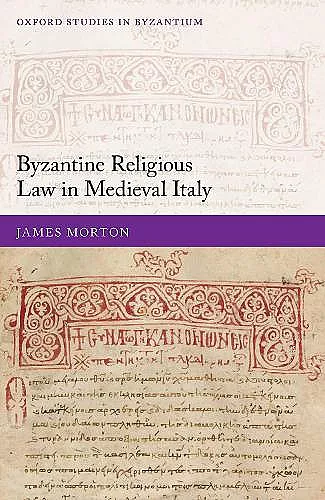Byzantine Religious Law in Medieval Italy
Format:Hardback
Publisher:Oxford University Press
Published:4th Mar '21
Currently unavailable, and unfortunately no date known when it will be back

Southern Italy was conquered by the Norman Hauteville dynasty in the late eleventh century after over five hundred years of continuous Byzantine rule. At a stroke, the region's Greek Christian inhabitants were cut off from their Orthodox compatriots in Byzantium and became subject to the spiritual and legal jurisdiction of the Roman Catholic popes. Nonetheless, they continued to follow the religious laws of the Byzantine church; out of thirty-six surviving manuscripts of Byzantine canon law produced between the tenth and fourteenth centuries, the majority date to the centuries after the Norman conquest. Byzantine Religious Law in Medieval Italy is a historical study of these manuscripts, exploring how and why the Greek Christians of medieval southern Italy persisted in using them so long after the end of Byzantine rule. The first part of the book provides an overview of the source material and the history of Italo-Greek Christianity. The second part examines the development of Italo-Greek canon law manuscripts from the last century of Byzantine rule to the late twelfth century, arguing that the Normans' opposition to papal authority created a laissez faire atmosphere in which Greek Christians could continue to follow Byzantine religious law unchallenged. Finally, the third part analyses the papacy's successful efforts to assert its jurisdiction over southern Italy in the later Middle Ages. While this brought about the end of Byzantine canon law as an effective legal system in the region, the Italo-Greeks still drew on their legal heritage to explain and justify their distinctive religious rites to their Latin neighbours.
Morton's book is good news for Byzantine canon law. He succeeds in making the "Italo-Greek" nomocanons of southern Italy, a difficult and practically unknown collection, accessible to a broader public, and he also elevates nomocanons in general by proving that they are not only legal or canonical sources but a source of material culture as well. Different readers will benefit in various ways from this excellent book not only because of the thorough, meticulous work done by the author but also because of his approach and methodology. * Daphne Penna, Speculum *
an original and ambitious attempt to reconstruct the history of Greek communities in southern Italy with an unusual perspective * Salvatore Cosentino, Church History *
The author, while making a little-explored and somewhat complex subject accessible to a wider audience, successfully highlights the unique way in which Southern Italy preserved and applied Byzantine law, extending its influence well into the Norman period. This legal tradition was safeguarded as a precious relic of a bygone era, undeniably contributing to the Byzantine identity of the region. * Olivier Delouis, CNRS, Paris â Revue des études byzantines *
- Winner of Runner-up, 2023 Dionisius A. Agius Book Prize, Society for the Medieval Mediterranean.
ISBN: 9780198861140
Dimensions: 240mm x 165mm x 25mm
Weight: 702g
336 pages